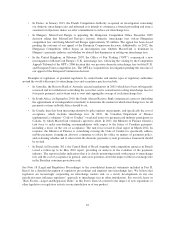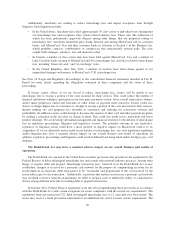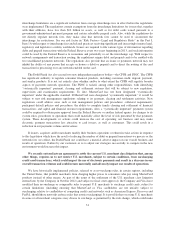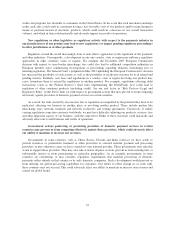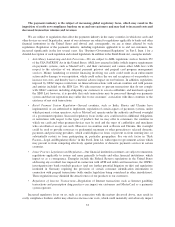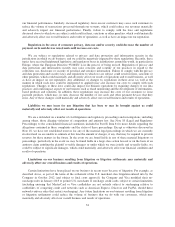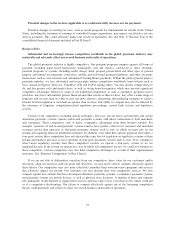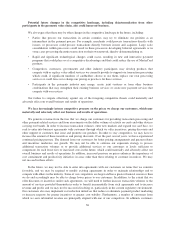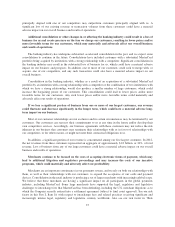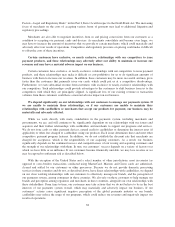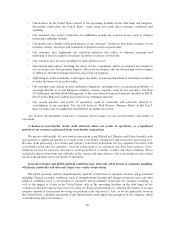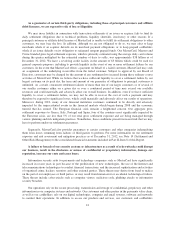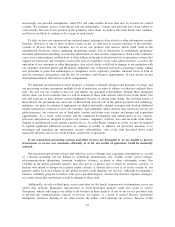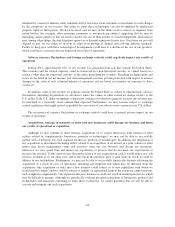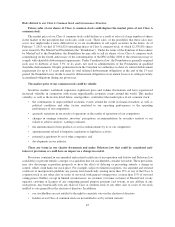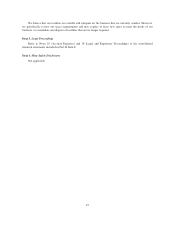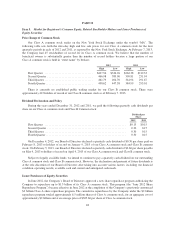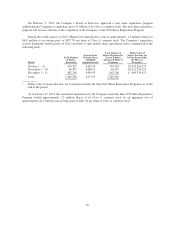MasterCard 2012 Annual Report Download - page 43
Download and view the complete annual report
Please find page 43 of the 2012 MasterCard annual report below. You can navigate through the pages in the report by either clicking on the pages listed below, or by using the keyword search tool below to find specific information within the annual report.In addition, our competitors may process a greater percentage of domestic transactions in jurisdictions
outside the United States than we do. As a result, our inability to control the end-to-end processing on cards and
other payment devices carrying our brands in many markets may put us at a competitive disadvantage by limiting
our ability to maintain transaction integrity or introduce value-added programs and services that are dependent
upon us processing the underlying transactions.
We rely on the continuing expansion of merchant acceptance of our products and programs. Although our
business strategy is to invest in strengthening our brands and expanding our acceptance network, there can be no
guarantee that our efforts in these areas will continue to be successful. If the rate of merchant acceptance growth
slows or reverses itself, our business could suffer.
The marketplace’s perception of our brands and reputation may materially and adversely affect our
overall business.
Our brands and their attributes are key assets of our business. The ability to attract and retain cardholders to
our branded products depends highly upon the external perception of us and our industry. Our business may be
affected by actions taken by our customers that impact the perception of our brands. From time to time, our
customers may take actions that we do not believe to be in the best interests of our brands, such as creditor
practices that may be viewed as “predatory”. Moreover, adverse developments with respect to our industry or the
industries of our customers may also, by association, impair our reputation, or result in greater regulatory or
legislative scrutiny. We have also been pursuing the use of social media channels at an increasingly rapid pace.
Under some circumstances, such use could also cause rapid, widespread reputational harm to our brands. Such
perception and damage to our reputation could have a material and adverse effect to our overall business.
Unprecedented global economic events in financial markets around the world have directly and
adversely affected, and may continue to affect, many of our customers, merchants that accept our brands
and cardholders who use our brands, which could result in a material and adverse impact on our overall
business and results of operations.
The competitive and evolving nature of the global payments industry provides both challenges to and
opportunities for the continued growth of our business. Unprecedented events which began during 2008 impacted
the financial markets around the world, including continued distress in the credit environment, continued equity
market volatility and additional government intervention. The economies of the United States and numerous
countries around the world were significantly impacted by this economic turmoil. Countries have experienced
credit ratings actions by rating agencies, including several in Europe as well as the United States. In addition,
some existing customers have been placed in receivership or administration or have a significant amount of their
stock owned by their governments. Many financial institutions are facing increased regulatory and governmental
influence, including potential further changes in laws and regulations. Many of our financial institution
customers, merchants that accept our products and cardholders who use our products have been directly and
adversely impacted.
MasterCard’s financial results may be negatively impacted by actions taken by individual financial
institutions or by governmental or regulatory bodies. The condition of the economic environment may accelerate
the timing of or increase the impact of risks to our financial performance. As a result, our revenue may be
negatively impacted, or we may be impacted, in several ways, including but not limited to the following:
• Declining economies, foreign currency fluctuations and the pace of economic recovery can change
consumer spending behaviors; for example, a significant portion of our revenues is dependent on cross-
border travel patterns, which may continue to change.
• Constriction of consumer and business confidence, such as in recessionary environments and those
markets experiencing relatively high unemployment, may cause decreased spending by cardholders.
39


